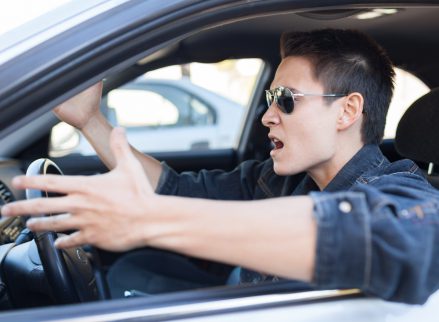by Lori Straus
Road rage can range from laying the horn on someone to flipping them the bird to shooting them in the face. Road rage itself is not a legal term; it refers to a generally understood list of reactions that express anger toward someone else while driving. In this blog post, we’ll share with you five tips on how to deal with road rage.
Your Actions Are Potentially Illegal
Road rage itself is not a legal term, but how you express your anger on the road can still lead to charges. For example, the 2019 incident that happened in London, Ontario, where one driver indeed shot another driver in the face led to numerous charges, including attempted murder, using a firearm in the commission of an indictable offence, and occupying a motor vehicle with a firearm.
That incident may seem obvious, but even shouting at someone, aggressively gesturing, or banging on their car can lead to charges of mischief or assault. The legal system has little tolerance for threatening behaviour, so you may find yourself facing a judge for your actions.
You May Be Right, But It’s Not Worth It
Researching an article like this can be a rabbit hole of videos: I saw a woman in England pinned between two cars in a suspected road rage case, people in a parking lot duking it out over a parking spot, and a driver unsuccessfully parallel parking and getting angry at the bus driver who was already parked in his spot. “Up next…” video suggestions promised more of the same.
If another driver is driving dangerously, following you, or assaulting you, don’t get even, get help. Anger can escalate quickly. Before you know it, you’re screaming at someone and a bystander is calling the police. It doesn’t matter if you’re right: if your behaviour is illegal, you can be charged.
 Take a Deep Breath
Take a Deep Breath
It may sound kitschy, but it’s true. We know that deep breathing can decrease stress, so take a few deep breaths when someone wrongs you on the road. Next, think of your friends and family. Not of the heroic story you’d love to tell them where you showed that driver their place in society. Think of you looking idiotic because you lost your cool and had to call for legal assistance from a police station.
Better Yet, Calm Yourself Before You Hit the Road
If you’re already angry about something else that happened in your day, calm yourself as much as you can before you get behind the wheel. If you’re feeling especially angry, there is no shame in either delaying your departure or even cancelling it.
Stop every few hours for a break on long trips, no matter how good you feel. You want to consciously lower your emotions back to zero before driving again. At the very least, if someone ticks you off, you have further to go before you act out and therefore more time to reign it all back in.
If You’re the Victim, Get Help
Sometimes, driving safely inexplicably enrages others. You may find yourself the recipient of abusive gestures, hurtful words, or even aggressive driving behaviours. Don’t fight back; get help instead. The Ministry of Transportation in Ontario suggests the following:
- Stay in your vehicle and keep your doors locked.
- Call police if possible.
- Attract attention by using your horn and signals.
- If you believe the aggressor is following you, do not drive home. Instead, head to a large public place or—better yet—a police station.
Don’t Get Even, Get Help
This goes for every situation. If you frequently get angry at other drivers, get help to learn how to manage your stress better. If someone is threatening you while you’re driving, don’t try to even the score. Call police instead. It doesn’t matter what the reason, there is no sense in risking injury, abuse, or legal action against you just to prove that you’re right. Because in the end, what would you rather be: right (and possibly drowning in legal fees) or happy?


